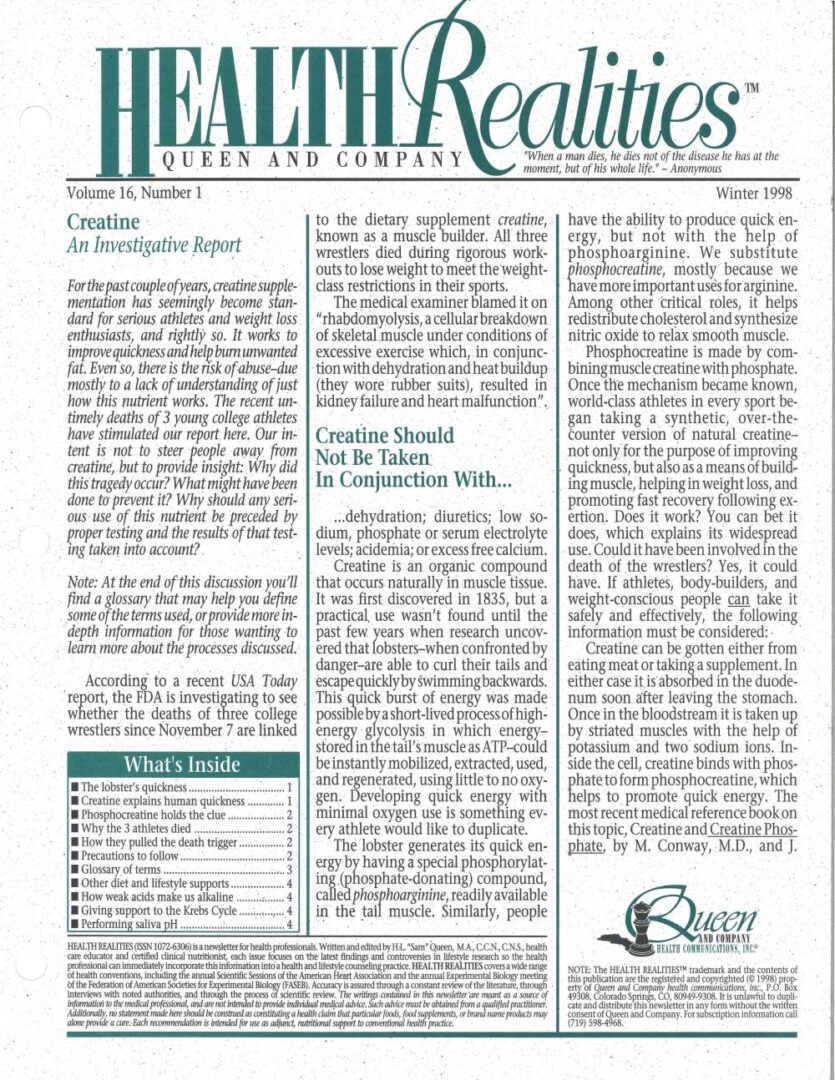What Is Creatine? A Comprehensive Review Of Creatine Use

Table of Contents
H2: What is Creatine and How Does it Work?
Creatine is a naturally occurring organic compound primarily found in skeletal muscle. It plays a crucial role in energy production, specifically during high-intensity exercise. Understanding how it works is fundamental to appreciating its benefits.
H3: The Science Behind Creatine:
Creatine's primary function is to help replenish adenosine triphosphate (ATP), the body's primary energy currency. During intense exercise, ATP is broken down to provide energy for muscle contractions. Creatine, in the form of phosphocreatine, acts as a reservoir, quickly replenishing ATP levels, allowing for more powerful and prolonged muscle contractions before muscle fatigue sets in. This is especially important for high-intensity activities like weightlifting, sprinting, and other anaerobic exercises.
H3: Types of Creatine:
While various forms of creatine exist, creatine monohydrate remains the most extensively researched and widely recommended form. Let's compare some common types:
- Creatine Monohydrate: This is the gold standard. It's cost-effective, readily absorbed by the body, and boasts a wealth of scientific evidence supporting its efficacy.
- Creatine HCL: Marketed as having superior absorption, creatine HCL requires further research to solidify these claims. While some studies show promise, more large-scale trials are needed.
- Creatine Ethyl Ester: This form is generally considered poorly absorbed and is not recommended for supplementation.
H3: Creatine Supplementation and Dosage:
The typical recommended daily dosage of creatine monohydrate is 3-5 grams. Many individuals employ a "loading phase" initially, taking 20 grams per day for 5-7 days to quickly saturate muscle creatine stores. Following the loading phase, a maintenance dose of 3-5 grams per day is sufficient. Remember to stay well-hydrated while taking creatine, as it draws water into muscle cells.
H2: Benefits of Creatine Supplementation:
The benefits of creatine supplementation are well-documented in numerous scientific studies. Here are some key advantages:
H3: Increased Strength and Power:
Creatine significantly enhances high-intensity exercise performance. By boosting ATP availability, it allows for more repetitions and heavier weight lifting, leading to noticeable increases in both strength and power output. Studies have repeatedly shown improvements in bench press, squat, and deadlift performance.
H3: Enhanced Muscle Growth:
Creatine plays a crucial role in muscle protein synthesis, the process by which your muscles build and repair themselves. This contributes significantly to muscle hypertrophy (increase in muscle size) and increased lean muscle mass. While creatine doesn't directly build muscle, it creates a more favorable environment for muscle growth. It may also play a role in muscle hyperplasia (increase in the number of muscle fibers), although further research is needed in this area.
H3: Improved Cognitive Function:
Some studies suggest potential cognitive benefits of creatine supplementation, including improved memory and reasoning. However, more research is necessary to fully understand the extent and mechanisms of these cognitive effects.
H3: Other Potential Benefits:
While less extensively researched, creatine shows potential benefits in other areas:
- Improved athletic performance across various sports
- Enhanced muscle recovery after intense training
- Potential neurological benefits (requires further investigation)
H2: Potential Side Effects and Precautions:
While generally safe, creatine supplementation can cause some minor side effects:
H3: Common Side Effects:
The most common side effect is weight gain due to water retention in muscles. This is generally considered harmless and often viewed as a positive aspect by those aiming to increase muscle mass. Some individuals may experience gastrointestinal upset, such as bloating or diarrhea, especially when starting supplementation. Muscle cramps are another potential side effect, though relatively uncommon.
H3: Who Should Avoid Creatine?
Individuals with pre-existing kidney problems, liver disease, or those who are pregnant or breastfeeding should consult their doctor before using creatine.
H3: Creatine Interactions:
Creatine may interact with certain medications. Consult your physician if you are taking any medication, particularly those affecting kidney function.
H2: How to Use Creatine Effectively:
To maximize the benefits of creatine, follow these guidelines:
H3: Choosing a Reputable Brand:
Opt for high-quality creatine monohydrate from a reputable manufacturer. Look for products that have been third-party tested for purity and quality.
H3: Proper Cycling and Stacking:
While some suggest cycling creatine (periods of use followed by periods of rest), strong scientific evidence supporting the benefit of cycling is lacking. A consistent maintenance dose is generally sufficient. Combining creatine with other supplements, such as protein powder and carbohydrates, may enhance its effects but is not mandatory.
H3: Combining Creatine with Other Supplements: Many athletes combine creatine with protein powder to support muscle growth and recovery. Combining with carbohydrates can also enhance creatine uptake and glycogen replenishment. However, these are not strictly necessary for effective creatine use.
3. Conclusion:
Creatine monohydrate is a safe and effective supplement that can significantly enhance strength, power, and muscle growth. While minor side effects are possible, they are usually mild and temporary. Remember to choose a high-quality product, follow recommended dosages, and consult your physician if you have any underlying health concerns. Ready to explore the potential of creatine to enhance your fitness journey? Learn more about finding the right creatine supplement for you!

Featured Posts
-
 This Weeks Ge Force Now Update Halo Balatro And More
May 15, 2025
This Weeks Ge Force Now Update Halo Balatro And More
May 15, 2025 -
 Can You Name The 2 Scorers On Every Nba Champion Since 1977
May 15, 2025
Can You Name The 2 Scorers On Every Nba Champion Since 1977
May 15, 2025 -
 Baby Names 2024 Classic And Modern Choices
May 15, 2025
Baby Names 2024 Classic And Modern Choices
May 15, 2025 -
 Hyeseong Kims Mlb Debut Imminent Dodgers Recall
May 15, 2025
Hyeseong Kims Mlb Debut Imminent Dodgers Recall
May 15, 2025 -
 Partido De Futbol Venezia Napoles En Vivo
May 15, 2025
Partido De Futbol Venezia Napoles En Vivo
May 15, 2025
